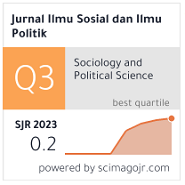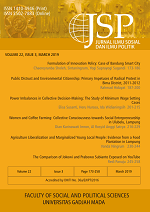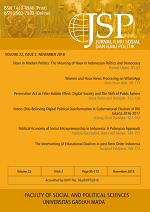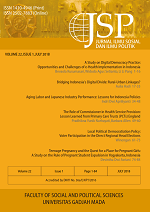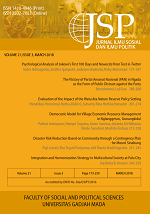Konflik Internasional Abad ke-21? Benturan Antarnegara Demokrasi dan Masa Depan Politik Dunia
https://doi.org/10.22146/jsp.13137
Mohamad Rosyidin
(1*)
(1)
(*) Corresponding Author
Abstract
'The clash of civilizations' of Samuel Huntington and 'the end of history' of Francis Fukuyama are two grand theories that have been widely accepted as the most dominant narratives in post-Cold War international relations. Unfortunately, there have been little theoretical developments in today's world to predict the future of international conflict. The theory assumed that the furture international conflict will not occur between democracies and non-democracies as Democratic Peace Theory proposed, but between established democracies and emerging democracies. The established democracies reluctant to share their power with the emerging democracies on how to manage global order. This reluctancy will lead to political frictions and conflicts among them. In spite of its theoretical breakthrough, this theory suffers of logical inconsistency since it does not distinguish between emerging democracies and emerging powers. Instead of conflict among democracies, this article argues that international conflict in the 21st century will be dominated by asimetrical conflict between nation-states and radical movements, conflict due to information openess, and conflict over natural resources.
Keywords
international conflict; the clash of democratization theory
DOI:
https://doi.org/10.22146/jsp.13137
Article Metrics
Abstract views : 6275
|
views : 44746
Refbacks
There are currently no refbacks.
Copyright (c) 2016 Jurnal Ilmu Sosial dan Ilmu Politik
This work is licensed under a
Creative Commons Attribution-NonCommercial-ShareAlike 4.0 International License .
<div class="statcounter"><a title="Web Analytics" href="http://statcounter.com/" target="_blank"><img class="statcounter" src="//c.statcounter.com/10932543/0/2e122c85/0/" alt="Web Analytics"></a></div> <div class="statcounter"><a title="Web Analytics Made Easy - StatCounter" href="http://statcounter.com/" target="_blank"><img class="statcounter" src="//c.statcounter.com/10932543/0/2e122c85/0/" alt="Web Analytics Made Easy - StatCounter"></a></div> View My Stats








